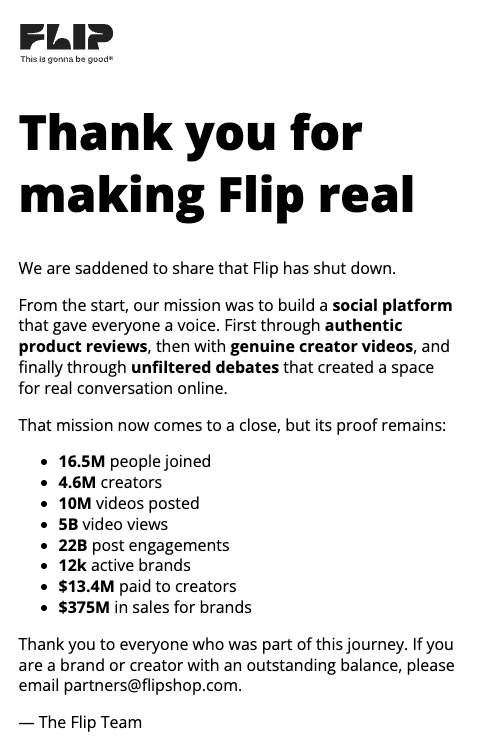- Beluga Files
- Posts
- Why Flip Failed and Why New Social Media Apps Barely Stand a Chance
Why Flip Failed and Why New Social Media Apps Barely Stand a Chance
The big guys win once again

Flip raised $144M at a $1.05 billion valuation… and still couldn’t compete
Flip was supposed to be the next big thing. Investors called it the future of shopping and social rolled into one. The app had short-form videos, easy checkout, and the kind of branding that makes you think this time it will work. And then it didn’t. Flip shut down earlier this month, joining a very long list of apps that tried to take on Instagram and TikTok and never made it past the opening gates.
If you follow social media history, this story looks familiar. Vine, Clubhouse, Lasso, even Threads had a meteoric start before fading. BeReal is still around but nowhere near TikTok scale. The pattern repeats because the big platforms have built walls that are nearly impossible to climb.
The walls around the giants
The major platforms do not just have billions of users. They have systems that keep everyone locked in.
Network effects. People use Instagram and TikTok because that is where their friends are. That is also where the creators they watch are. Moving to a new app means convincing both to leave at the same time.
Copycat features. Any fresh idea gets absorbed almost immediately. Stories started on Snapchat and are now on Instagram, Facebook, YouTube, and even Twitch (this one seems random). Live audio launched Clubhouse, but Twitter, Facebook, and Spotify built their own versions and crushed the novelty.
Money for creators. Vine died because it never paid its stars. Flip could not get enough buyers in front of enough sellers to keep creators earning (despite their massive creator fund). TikTok, YouTube, and Instagram can all point to real payout systems. Even if they are flawed, they provide enough money to keep creators on their platforms.
Advertising infrastructure. Brands spend billions on Meta, Google, and ByteDance because the tools are there and the scale is proven. A startup with a few million users cannot compete with that machine.
What Flip promised
Flip’s pitch was simple. Watch a product video and buy the item right there. Social e-commerce has been exploding in Asia and Flip wanted to be the U.S. version (like China’s Kuaishou). On paper, it made sense. In practice, it required two things that never came together.
First, a massive audience willing to shop inside the app. Second, a steady pipeline of brands and merchants uploading enough products to make the store feel alive. Without both sides, Flip felt half empty. And because the audience was small, creators could not earn enough to justify staying. As creators posted less, users stopped engaging, and the negative feedback loop eventually ended with Flip shuttering.

Post on Flip’s homepage 8/30
The bigger lesson
Flip failed for the same reasons so many others did. Retention is the real metric and most of these apps never cracked it. If people are not checking your app every single day, it is over. Monetization is the next wall. If you cannot pay creators, they will go to platforms that can. And finally, purpose matters. If your only real advantage is a feature, you are finished the moment Instagram or TikTok rolls out a copy.
Clubhouse could not keep people engaged once the pandemic ended. Vine could not pay. Threads spiked to 100 million signups and then lost most of them within a month. Flip could not fill both sides of the marketplace. The details differ but the outcome is the same.
Bottom line
The giants keep winning because they do not just build products. They build habits, payouts, and ad systems. This makes it incredibly hard for a newcomer to compete. Flip is not the first app to learn this and it will not be the last.
For a new social platform to survive, it has to be more than new. It has to be necessary, sticky, and profitable in record time. Otherwise it ends up like Flip. Another name on the long list of what might have been.
Keep on Creating!
— The Beluga Labs Team